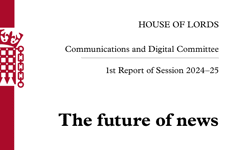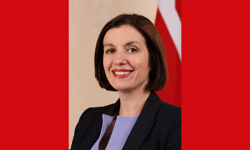
A bit of abuse was seen as part the job, but hostility by the right and left to the “mainstream media” and a torrent of abuse on social media have taken attacks on journalists to a new level.
Abuse isn’t confined to anonymous trolls and political activists. When The Times uncovered evidence that Labour MP Kate Osamor had lied, when she claimed to have known nothing about her son’s prosecution for drug offences until he appeared in court, it sent a reporter around to her house for a comment. The Times had found out the MP had written to the trial judge asking for leniency prior to the case.
The Times says Osamor responded to its reporter by saying she “should have come down here with a bat and smashed your face in”. She told the reporter to “f*** off”, called police after accusing him of stalking her and hurled a bucket of water at him. Although she resigned from her post as shadow international development secretary in December, Osamor remained an MP and did not apologise for her behaviour to the paper.
In a leader, The Times commented: “Across the world, attacks and threats against journalists are on the rise. This is no longer limited to authoritarian countries. In the past year, reporters have been killed in Slovakia and Malta. Populist politicians in western countries use increasingly violent language against journalists. President Trump routinely refers to the press as the “enemy of the people”. Ms Osamor did not just throw a bucket of water at our reporter, she threw it at all of us."
Michelle Stanistreet, general secretary of the National Union of Journalists, responded to the Osamor incident: “Journalists, like any other workers, need to be able to go about their work without fear of threats or assault. It’s completely unacceptable to respond to legitimate press queries, however unwelcome they may be, with physical or verbal abuse.
“There is a disturbing and febrile international climate at the moment that is facilitating and legitimising the notion that it is open season on journalists – such insidious and dangerous beliefs, particularly when they emanate from public figures in positions of authority, have to be challenged at every turn.”
As the Brexit debate became more frenzied, broadcasters were forced to hire security guards to protect their staff conducting interviews outside Parliament. Guardian columnist Owen Jones was chased and abused by far-right protestors in yellow jackets after doing a TV interview. Sky News political correspondent Faisal Islam was subjected to racial abuse and Sky News presenter Kay Burley to sexist comments.
Jones told BuzzFeed News: "Both the media and politicians – with rhetoric of 'enemies of the people' to 'traitors' and 'saboteurs' to the left being 'terrorist sympathisers' and haters of their own country – are partly to blame for this increasingly toxic atmosphere."
Two-thirds of women journalists in a global survey said they had been subjected to online abuse.
Worse for women
In November, the International Federation of Journalists published a report revealing almost two-thirds of women journalists in a global survey said they had been subjected to online abuse. The online harassment took various forms including death or rape threats, insults, the devaluation of work, sexist comments, being sent obscene images, cyberbullying, cyberstalking and account impersonation.
IFJ general secretary Anthony Bellanger says: "Online abuse can have a devastating effect on a female journalist's career and on democracy. We must show abusers that online abuse is not OK and must not go unpunished. We must expose the abusers and make sure there is no impunity for these attacks.”
The IFJ gave as an example of harassment the case of Daphne Caruana Galizia. In the years before the investigative journalist was murdered in Malta in October 2017, she was the target of an online smear and harassment campaign led by key political figures that did not like her investigating them. They encouraged people to film and photograph her and post the results on social media, mocking her and calling her a “witch”. She said: “In one year, there were 380 posts about me. I’d be in my local coffee shop having a cup of coffee and they’d encourage people to take photos of me and send them in. There’s no news value in that, it was just harassment.”
The award-winning Observer journalist Carole Cadwalladr has faced a barrage of personal abuse online during her investigation into the misuse of data by Leave campaigners. Among those who have mocked her on Twitter are the Russian Embassy, WikiLeaks’ Julian Assange and Brexit-backer Arron Banks.
Madison Marriage, the Financial Times reporter who went undercover to expose sexual harassment at the Presidents Club charity dinner, says she was subject to online trolling, hate mail and abusive phone calls after the paper published her investigation.
The BBC’s political editor Laura Kuenssberg has been targeted with sexist abuse online, accused of being biased against Jeremy Corbin and was protected by security guards at the Labour Party conference. A BBC cameraman was assaulted at a Trump rally in Texas.
It’s all very well to say, “if you can’t stand the heat, get out of the kitchen,” as one BBC presenter told me, but many journalists are encouraged and required to interact with social media to promote more online traffic to their articles and engage with readers. This lays them wide open to vile abuse on Twitter, Facebook and other platforms.
Trump’s denigration of the media and journalists has been copied beyond the US. Far-right activist Tommy Robinson, speaking outside the Old Bailey in October, retorted: “To the journalists… the British public do not trust you, they do not believe you. You are the enemy of the people."
There is a disturbing and febrile international climate at the moment.
Abuse from left and right
In France, the Gilets Jaunes protestors have turned on journalists covering their demonstrations. They have been attacked, spat at, pelted with bottles, and been called “collaborators”. In Italy and Germany, journalists have been targets of far-right groups.
Susie Beever, who works for the Huddersfield Daily Examiner and Leeds Live tweeted after covering a far-right protest in Leeds: “I got into work to be greeted by an email telling me I would ‘soon be paying the ultimate price’. It’s interesting how the people who demand their right to freedom of speech in these protests are the same people who send threatening, aggressive and expletive emails to journalists because they don’t like the fact the free press have covered them."
The NUJ says its members have reported a spate of incidents of intimidation, threats and violence carried out by far-right protesters systematically targeting the media, especially photojournalists. The increase in threats has prompted the union to call for stronger action from the authorities to defend press freedom and tackle the perpetrators.
In a report called ‘Online harassment of journalists: the trolls attack’, Reporters Sans Frontières voiced concern about the scale of the threat to press freedom by mass harassment of journalists online. RSF says the harassment may come from ordinary “haters” – individuals or communities hiding behind their screens – or “troll armies” of online mercenaries created by authoritarian regimes. In both cases, RSF says the goal is the same, to silence journalists whose reporting annoys, often using exceptionally abusive methods.
Online harassment is a phenomenon that is spreading throughout the world and now constitutes one of the gravest threats to press freedom.
Information wars
RSF secretary-general Christophe Deloire says: “Online harassment is a phenomenon that is spreading throughout the world and now constitutes one of the gravest threats to press freedom. We have discovered that information wars are not just waged between countries at the international level. Journalism’s predators also deploy troll armies to hunt down and harass all those who investigate and report the facts honestly. These despots let their mercenaries train their guns on journalists on the virtual terrain as others do in actual war zones.”
It may seem a leap between the verbal abuse of journalists to the pre-meditated murder of reporters like Marie Colvin or Jamal Khashoggi, but the rhetoric of “fake news” and “enemies of the people” can only embolden those despots who want to silence the media.
According to the IFJ, 94 journalists and media staff lost their lives in targeted killings, bomb attacks or crossfire incidents last year – up 12 on 2017. It says the increase in killings took place in the context of an increasing polarisation of views across the world with the rise of dangerous nationalist and populist forces in many countries and the stigmatisation of journalists and the media by politicians and the enemies of press freedom. The report highlights the level of impunity across the world where 90 per cent of cases involving the killing of journalists go unresolved.
Fighting back
There are encouraging signs of a fight back. An American judge ruled in February the Assad regime “deliberately targeted” Marie Colvin and has awarded £230 million in punitive damages. The IFJ has launched a campaign for an International Convention dedicated to the protection of journalists.
Foreign secretary Jeremy Hunt has made defending a free media a central element of British foreign policy. Hunt plans to bring together other like-minded countries for an international conference in London in July to “galvanise a consensus” on the need to protect journalists working around the world.
Sadly, protection is no longer needed just for journalists working under repressive regimes but also from threats on social media; a US president who attacks a free press; extreme nationalists, right and left-wing activists who despise the mainstream media; and even an MP who abuses a reporter on her own doorstep. They hate us, and we should care.
The rhetoric of “fake news” and “enemies of the people” can only embolden those despots who want to silence the media.












